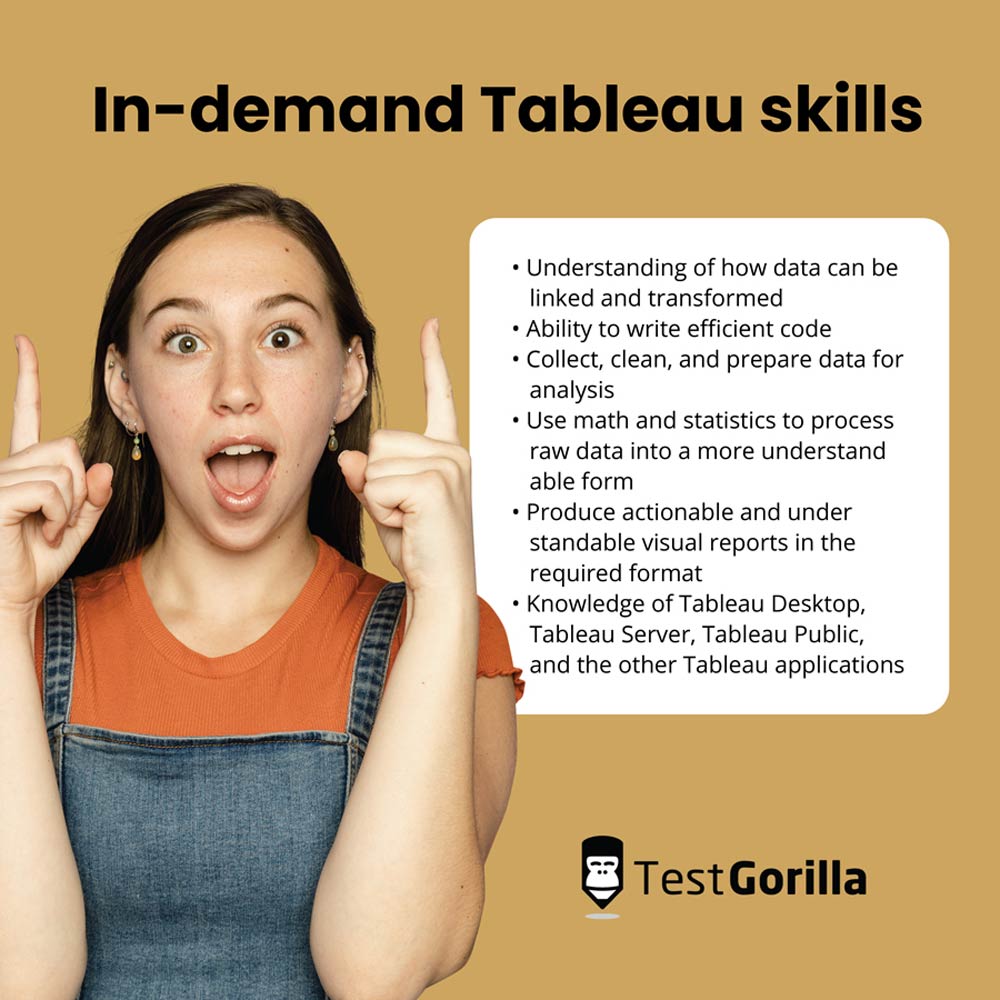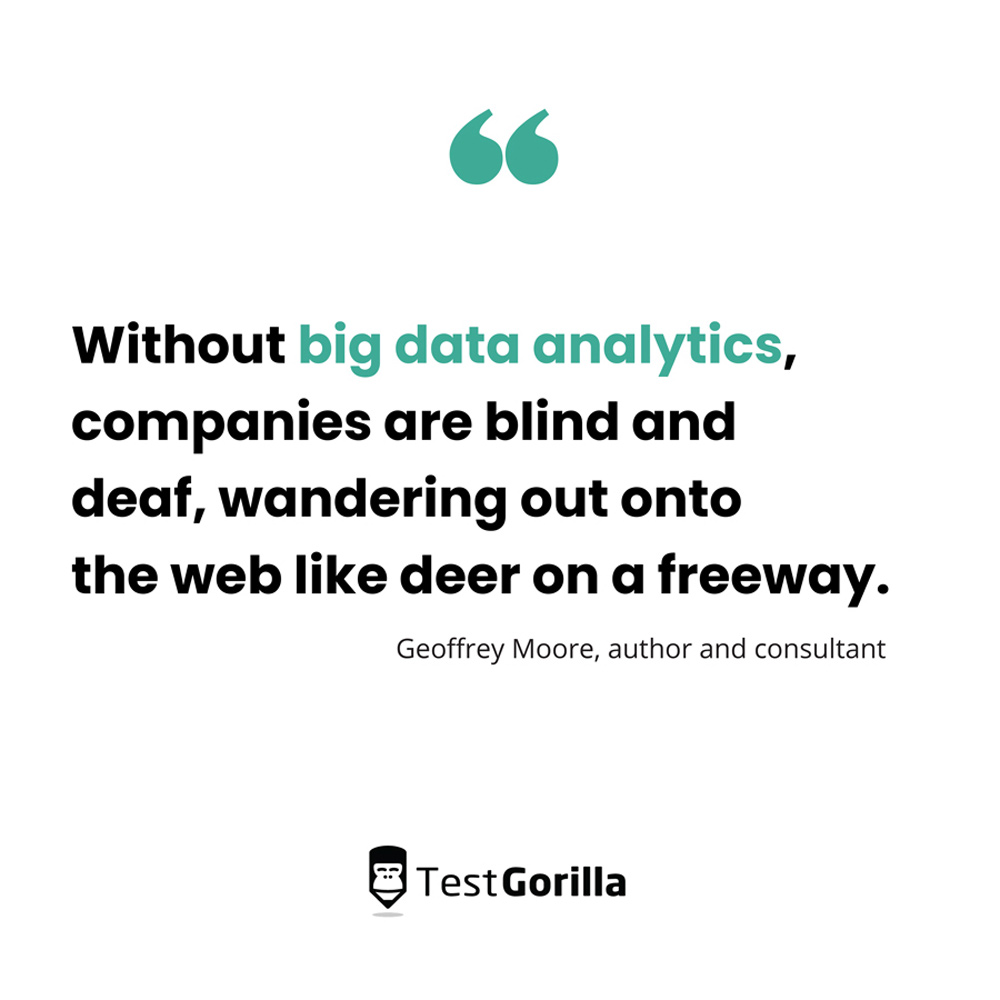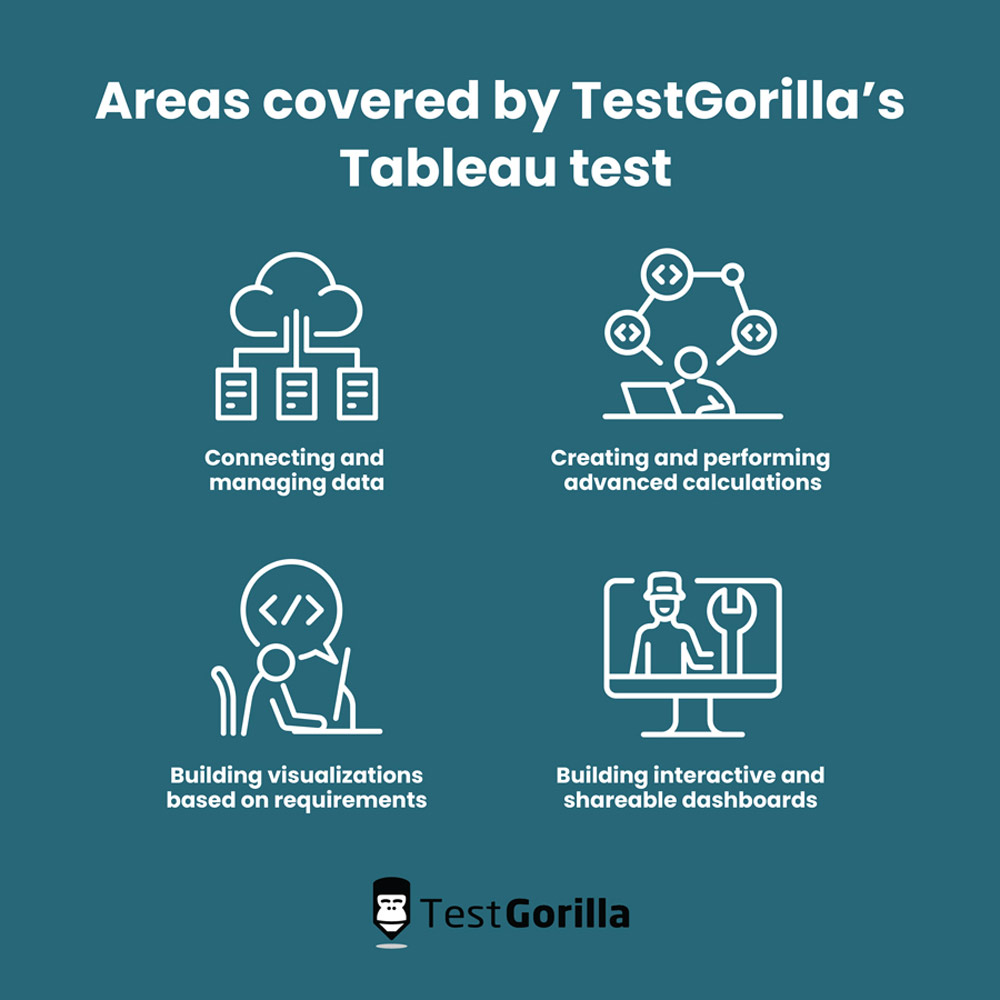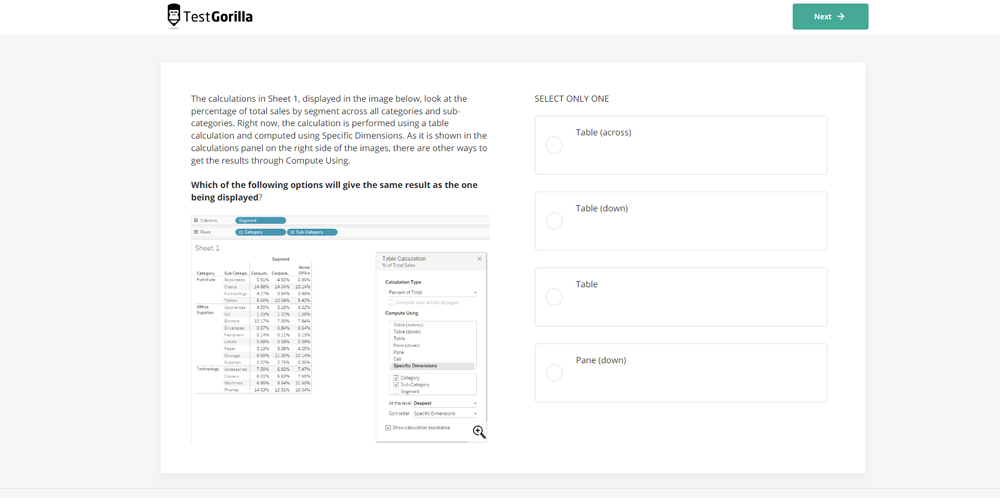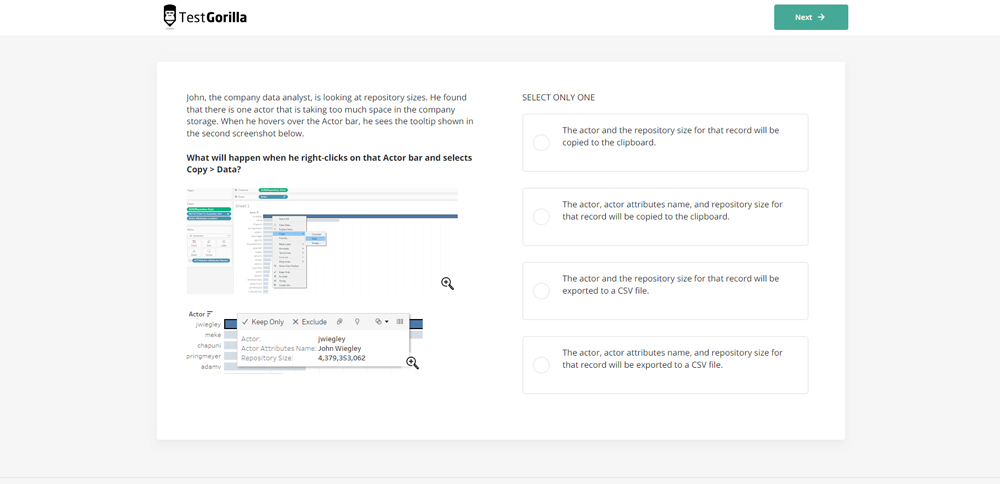Finding the right Tableau developer for your organization may seem like a daunting task.
That’s especially true if you aren’t familiar with the software or the essential Tableau skills a developer needs to use it effectively.
Don’t worry; help is at hand. We’re going to guide you through all the steps to hire a talented Tableau developer, including an overview of TestGorilla’s Tableau test, which is designed to make the hiring process faster, fairer, and easier for both you and your candidates.
First, let’s take a closer look at Tableau itself, and the key skills developers should have.
Table of contents
- What is Tableau used for?
- What does a Tableau developer do?
- Top technical Tableau skills for developers
- Non-technical skills for Tableau developers
- Use TestGorilla’s Tableau test to find the best candidates
- Use skills assessments for deeper understanding of candidates
- Skills-based hiring is the future of recruitment
What is Tableau used for?
The amount of data produced daily for organizations is huge. Without programs like Tableau, businesses would struggle to extract the useful data from the rest. The software extracts meaningful data and makes it easy to understand through data analysis and data visualization.
Tableau is the fastest-growing data visualization and reporting tool for business intelligence. It simplifies data so that it can be understood by staff at any level of an organization.
Tableau is divided into two areas:
Developer tools: These are Tableau tools used for development. They include dashboard creation, charts, report generation, and visualization. The Tableau products in this category are the Tableau Desktop and Tableau Public.
Sharing tools: These are the tools for sharing the visualizations, reports, and dashboards created with the developer tools. Tableau products in this category are Tableau Online, Server, and Reader.
So, although you may be familiar with the Tableau sharing tools within your organization, there is a lot that goes on behind the scenes, so it needs to be overseen by an experienced Tableau developer.
What does a Tableau developer do?
Tableau developers use the software for analyzing data, creating data visualizations, and the business intelligence process.
The job role includes developing, maintaining, and running the platform. As more companies choose to use data analytics, developers with Tableau skills are in high demand.
The major responsibilities of Tableau developers include:
Developing advanced reporting, analytics, dashboards, and other business-intelligence solutions
Creating understandable visualizations of the extracted data
Identifying patterns and insights from data analysis
Managing the Tableau server
Improving performance by twisting SQL queries
Discovering areas of automation for making the business process more efficient
Performing and documenting data analysis, data validation, and data mapping/design
Reviewing and improving existing systems
Collaborating with teams to integrate new systems
Creating tools to store data within the organization
The best insights on HR and recruitment, delivered to your inbox.
Biweekly updates. No spam. Unsubscribe any time.
Top technical Tableau skills for developers
If you are looking for a Tableau developer for your organization, it’s essential that they possess the capabilities needed to use the platform. Here, we take a look at the six key Tableau skills a developer should have.
1. Basic data comprehension
Understanding how data can be linked together and how it can be transformed into an easily understandable structure is one of the basic skills a Tableau developer needs.
A developer must have experience in working with databases and spreadsheets, along with the ability to gather and query data.
2. Preparing data for effective analysis
Preparing the data for analysis is also an important part of a Tableau developer’s job. This includes data discovery, data transformation, and cleaning the data. Data preparation tools like Tableau Prep Builder are often used to assist with this.
Developers need to know how to source, gather, arrange, and process data, and how to present the data in the best form to the end users so it can be understood and used to make decisions.
3. Writing efficient code
Tableau developers must know how to write code that is both efficient and easy to maintain.
There are lots of different coding languages used in data science, and Tableau developers need to be able to create algorithms or programs to parse the data successfully.
Although it is not essential for Tableau users, a good knowledge of Structured Query Language (SQL) is valuable, as it’s useful for dealing with databases and automation.
4. Math and statistic skills
Math and statistics are critical in data science. These skills ensure developers have the power to process data into a more valuable form than just lists of numbers or information.
Data scientists need to perform exploratory data analysis and find key patterns and relationships. A strong knowledge of statistics assists data scientists with critical thinking about the value of different types of data and what is useful.
They also need to know the limitations of specific test models and their suitability for problem-solving. Sometimes the problems need new solutions, which may require the developer to modify or combine analytics tools and techniques.
5. Analytical and visualization skills
It’s not much use to anyone if a Tableau developer is great at the tech stuff but not so good at producing useful, understandable visual reports such as charts and graphs.
The reason business management and other colleagues require these reports in the first place is so they can make informed decisions based on the data presented to them.
Data scientists must be able to build visualizations based on requirements**.**
6. Tableau software
Knowledge of how to use the different sections of Tableau software is also essential for a skilled data scientist. They should know their way around Tableau Desktop, Tableau Server, Tableau Public, and the other Tableau applications.
By using these tools, a Tableau developer can find, organize, and present data to suit any audience.
Non-technical skills for Tableau developers
Although technical Tableau skills are essential, non-technical and soft skills are also important when it comes to hiring a good Tableau developer.
Soft skills, such as communication, are among the most in-demand skills employers are looking for.
You could find a Tableau developer who looks great on paper and has all the hard skills required, but what happens if they don’t work well within a team or they have a terrible communication style?
You might find your formerly happy and productive team start to lose their motivation and tension creeps into the workplace. That’s why Tableau testing is just one part of finding the perfect candidate – you should also check out their non-technical skills to see if they will be a good fit.
Communication
We all need to communicate every day using a mixture of the four communication types, but not everyone is good at it.
Connecting with other people, and exchanging information and ideas with them, helps to get things done quickly, but it’s not just what we say that matters, but how we say it. This is where good communication skills are essential for both verbal and non-verbal exchanges.
Data scientists not only need to be good at analyzing data, they must also be able to explain their findings clearly to different audiences across an organization. This enables teams to act on the data to solve problems and improve efficiency.
Critical thinking
Critical thinking skills can be useful for many job roles, and for data scientists, they are essential. They need to be able to objectively analyze questions and results, and to look at problems from all angles.
Understanding the depth of a problem is a first step towards developing a solution, and questioning information instead of taking it at face value helps with decision-making.
Teamwork
There may be a popular misconception of data scientists, programmers, and other tech-type people as genius loners who don’t do teamwork, but the reality is very different.
A good Tableau developer will be able to collaborate effectively and work closely with others, as this is a crucial part of being a data scientist.
Use TestGorilla’s Tableau test to find the best candidates
CVs should be consigned to history, where they belong. They are not a reliable indicator of future job success or real-life job skills, but instead are a dry list of past experience and certifications.
Anyone can write down a whole list of skills on a CV, but it doesn’t mean they possess those skills. One-third of American workers admit to lying on their resume, and IT workers and finance professionals are the most likely to stretch the truth about their abilities.
It’s a big problem, but what’s the solution?
It’s simple – TestGorilla’s Tableau test.
Here at TestGorilla, we believe that skills-based hiring is a better indicator of future job success than the CV. Candidates can’t cheat their way through our tests and assessments, so what you’ll get is an honest evaluation of an applicant’s real job skills.
When skills-based testing within an assessment (more on that in a moment) is used at the start of the hiring journey, it removes the need for CVs. The candidates take the tests, and you get the results.
You can then choose to invite the top scorers for an interview, safe in the knowledge that they have the correct skills for the job role. And all that is done without even looking at a CV or cover letter.
Hint: If you need ideas for the questions you should ask, check out our selection of the best Tableau interview questions.
So, how does TestGorilla’s Tableau test work?
All our tests are written and reviewed by subject-matter experts, and the Tableau test assesses candidates’ skills in the core functionality of the software, including:
Connecting and managing data
Creating and performing advanced calculations
Building visualizations based on requirements
Building interactive and shareable dashboards efficiently
Candidates who rank highly in the Tableau test have the right technical skills in using Tableau and are able to use it within the context of an organization to provide the right data to different stakeholders.
Below are some sample questions from the Tableau test to give you a deeper understanding of the skills needed to score highly on this test:
The question in the Tableau test above looks at the candidates’ knowledge of different ways to get the same results, and the one below evaluates their ability to know what result they will get when they perform a specific procedure in Tableau. Our Tableau test gives candidates a thorough evaluation of their Tableau skills.
Use skills assessments for deeper understanding of candidates
Our Tableau test will tell you which candidates have the right technical skills for your job. However, as we mentioned earlier, to be successful in the role a developer also needs to have other skills to ensure a good fit within your organization.
TestGorilla’s skills assessments enable you to add up to five individual tests that you decide are relevant to the job role. This could include tests to evaluate a candidate’s communication skills, their personality type, or how well they align with your organization’s values as well as the Tableau test.
These tests form one complete assessment. The candidate takes all the tests within the assessment in one sitting, and you receive the results of each of the tests to help you decide whether to take the applicant forward to the next stage.
Which tests should you include in an assessment for a Tableau developer?
If you take a look at our test library, you’ll see a large variety of tests that will fit well alongside the Tableau test. They are categorized into:
Job roles
Cognitive ability
Language
Personality and culture
Programming skills
Role-specific skills
Situational judgment
Software skills
You can also use the search box on the left to quickly find specific tests relevant to your query.
Because a Tableau developer needs more than just technical skills, you might find adding some of these tests to your assessment alongside the Tableau test useful:
Communication test: Evaluate how well your candidates listen, communicate, deal with feedback, and show empathy
Critical Thinking test: Discover how effective candidates are at thinking independently, solving complex problems, and generating innovative solutions
SQLite (Coding) test: See how much experience applicants have in joining and filtering results, data manipulation with calculations while considering data sorting, rounding numbers, and excluding irrelevant entries
One of our Personality & Culture tests: These tests aren’t meant to be used to make hiring decisions, but are designed to give you a deeper understanding of your candidate’s personality, motivation, and how well they align with your organization’s value set.
Skills-based hiring is the future of recruitment
We hope you found this guide to the skills of a successful Tableau developer useful. When you include Tableau testing as part of a varied assessment, you make the hiring process fairer for the candidates, as well as reducing the time-to-hire. We’re excited about making skills-based hiring a driving force in the modern workplace, and we would love to share that enthusiasm with you.
Why not sign up for our free plan and get the TestGorilla experience?
Browse the test library, look at the sample questions, and perhaps create an assessment to take yourself – you might learn something new about your own skills, and you’ll get to know how the testing process works.
You've scrolled this far
Why not try TestGorilla for free, and see what happens when you put skills first.


